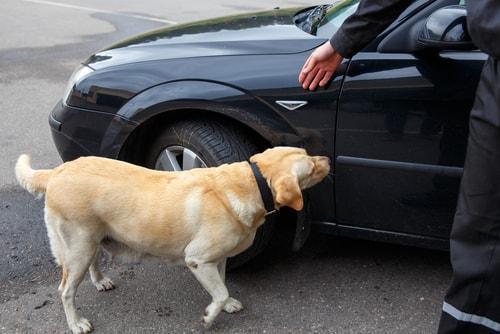UPDATE: Drug-Sniffing Dogs May Now Be Overqualified
 Originally published: December 26, 2016 - Updated April 20, 2022
Originally published: December 26, 2016 - Updated April 20, 2022
Update: At our law firm, we have consistently kept up with all of the changes to the laws regarding marijuana use in the state of Illinois. A few years ago, we put together the post shown below as a consideration in the decriminalization of cannabis that was going on at the time. We highlighted some expert opinions that expressed concern over the use of drug-sniffing dogs in the state as the criminal penalties for low-level marijuana possession were being lifted.
Today, these concerns have grown even further as the state of Illinois has fully legalized the recreational use of cannabis for adults in the state. As of January 1, 2020, an adult over the age of 21 is permitted to possess and consume cannabis for recreational purposes and to purchase cannabis from state-licensed dispensaries.
One unintended consequence of the new law has been the early retirement of many drug-sniffing dogs in police departments around the state. (The same is happening in other “legal” states throughout the country.” It is very difficult, in many cases, to retrain a drug detection dog to ignore marijuana once the animal’s original training is complete. As a result, police departments are retiring their dogs earlier than originally expected and, in some situations, replacing them with dogs who have been trained to focus on other illicit drugs such as cocaine, heroin, and meth.
________________________________________________________________________________________________________________
If you have been charged with a drug crime as the result of an alert by a drug-sniffing dog, the team at Luisi Legal Group is ready to help you. Contact a Chicago drug crimes defense lawyer by calling 773-276-5541 for a free consultation and case evaluation today.
In a recent post on this blog, we discussed in detail how the approach to marijuana has evolved in recent years in the state of Illinois. Earlier this year, state lawmakers passed a measure to decriminalize small amounts of marijuana, taking low-level possession of the drug from a potential felony to a civil offense comparable to a parking ticket. For many, the new law is a welcome change, as, under the previous statutes, a person could be prosecuted for low-level drug possession just for riding in the same car as another person with marijuana in his or her possession.
The new law, however, has also created a number of questions, particularly in regard to how law enforcement officers approach an investigation into possible drug possession. With low-level possession of marijuana no longer considered a crime, could drug-sniffing dogs be largely out of job?
Reasonable Suspicion, Probable Cause, and Drug-Sniffing Dogs
If you are pulled over for a traffic violation, a police officer may only require you to wait for a drug-sniffing dog to arrive if he or she has a reasonable suspicion that your car contains evidence of a crime. If and when the dog indicates the presence of illegal drugs, the officer then has probable cause to search your vehicle. Probable cause means that there is a reasonable basis for believing that a crime has been committed and/or evidence of the crime is present in the vehicle.
Even before the law was changed, there were countless questions and challenges to the use of drug-sniffing dogs and subsequent searches and seizures. In many cases, evidence found as a result of improper searches—those lacking justifiable reasonable suspicion and/or probable cause—was deemed inadmissible in court, often leading to the dismissal of the charges against the defendant.
New Complications
Going forward, it seems that reasonable suspicion and probable cause may be even more difficult to establish, especially when drug-sniffing dogs are involved. This is because possession of less than 10 grams of marijuana is no longer a crime in Illinois. It is against the law, but not a criminal offense. So if a police officer pulls a driver over and in the course of the stop smells marijuana in the car, does the officer really have reasonable suspicion that a crime has been committed? Is it possible for the officer to reasonably suspect the presence of more than 10 grams of marijuana?
The same question applies to the behavior of a drug-sniffing dog. Such animals are capable of detecting small amounts of illicit drugs, but they cannot indicate to their handlers what type of drug they smell or how much. This means that a drug-sniffing dog could reasonably detect a very small amount of marijuana. When the possession of any amount of marijuana was a crime, it was understandable that the dog’s indication of the presence of drugs constituted probable cause. Now that the possession of marijuana is not necessarily a criminal offense, the introduction of a drug-sniffing dog could complicate the situation.
Since the law went into effect in late July, there has not been a definitive court ruling in Illinois on the matter. It would seem, however, that such a case is likely to arise in the very near future.
Have Your Rights Been Compromised?
If you are facing criminal charges as the result of a search that you believe was improper or illegal, you need qualified representation immediately. Contact Luisi Legal Group to speak with an experienced Chicago criminal defense attorney right away. Call 773-276-5541 and schedule your free initial consultation.
Sources:
http://www.wcvb.com/article/with-marijuana-legal-many-police-dogs-are-now-overqualified/8503089
https://www.law.cornell.edu/wex/probable_cause
http://www.ilga.gov/legislation/publicacts/99/PDF/099-0697.pdf







